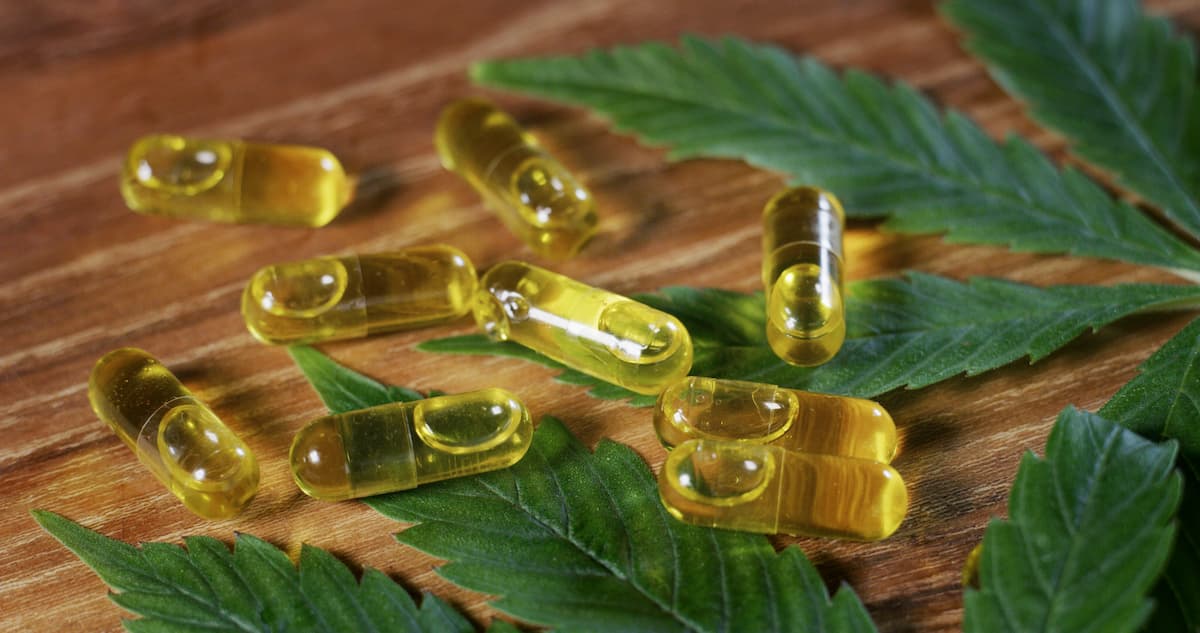With more than its fair share of innovators, the cannabis industry constantly welcomes new products and concepts. We’re going to be exploring cannabis THC capsules, one of the latest debuts to hit the scene, helping you understand:
- What cannabis capsules are and how they work
- Why THC capsules might be a good option for you
- Types of THC capsules and where to buy them
Whether your cannabis of choice comes in the form of an edible vape oil or a classic pre-roll, it’s always exciting to hear about new ways to enhance your experience. It wasn’t that long ago that cannabis consumers were mainly limited to smoking, but the range of options has expanded at a fast and furious rate within the last few years. Now, as cannabis legalization spreads across the U.S. and manufacturers and cultivators kick their creativity into high gear, you have more product options than ever before. THC capsules are among the new types of cannabis available for sale, and they have plenty of people talking. We’ve put together a comprehensive guide to THC capsules, giving you all the impressive details about these convenient cannabis pills. Once you’re done reading, you’ll be ready to decide if cannabis capsules are right for you – and you’ll have everything you need to know to head to your local dispensary and start shopping.
What are THC Capsules?
THC capsules are dosage-controlled cannabis capsules made using a highly refined extract from the cannabis plant and neutral oil. In simplest terms, it’s a cannabis tincture packaged in capsule form. You might have heard them called cannabis oil capsules, THC pills, or any one of several other names. The two key components of a cannabis capsule are:
- Cannabis extract: A highly-concentrated cannabis extract is obtained from the cannabis plant by an extraction method chosen by the manufacturer. THC capsules, in particular, are high in THC (tetrahydrocannabinol), but there are also capsules that contain only CBD or varying ratios of CBD/THC.
- A neutral oil suspension: THC is not water-soluble, so it has to be “suspended” in an oil of some sort to allow your body to properly absorb it (so you can experience the intended effects). The most common types of oils used are in a category known as medium-chain triglycerides or MCT oils since they are ideal for digestion and absorption.
Both medical marijuana patients and recreational consumers can reap the benefits of cannabis capsules.
What are the Benefits of THC Capsules?
So, what benefits do cannabis capsules have to offer? Like any form of cannabis, capsules/pills can come with their own advantages – some of which could make them a perfect fit for you.
- Convenience: Does it get any easier than taking a cannabis capsule? Not really – the process is just like taking any other oral supplement: just pop the capsule in your mouth, get a sip of water, and swallow.
- Discretion: For some consumers, being able to reap the benefits of marijuana without drawing any attention to smoking or vaping is a major plus. Even if you enjoy smoking in certain situations, capsules can be a quick and discreet option that comes in handy other times.
- Precision-level control overdosing: For medical marijuana patients, in particular, being able to closely control the amount of cannabinoids you’re ingesting makes it much easier to create the ideal experience and results. Because each cannabis capsule is formulated with an exact amount of THC/CBD, it eliminates the guesswork in dosing.
- A smoke-free alternative: Many people prefer to avoid smoking or vaping for reasons associated with personal preferences or medical conditions. For example, an individual with respiratory issues might not want to smoke marijuana in the traditional sense – but a THC capsule makes the smoke a non-issue.
- Extended effects: Usually, the effects of capsules with cannabis last longer than those from smoking and vaping. So, individuals that want longer-term support with certain symptoms might opt for capsules for several hours of relief.
Inhaled vs. Cannabis Capsules: Understanding the Differences
When you smoke or vape cannabis, the delivery of cannabidiol (CBD) and tetrahydrocannabinol (THC) occurs virtually instantly through your lungs. But with capsules, the absorption of cannabinoids is a more drawn-out process. In order to break down a THC capsule, your body has to metabolize it through your liver. As a result, the therapeutic effects of THC (and/or CBD) can take longer to kick in, but they’ll also tend to last for a longer period of time. This is a major draw for individuals seeking steady symptom relief and long-term reduction of pain, anxiety, and similar issues. There are other differences between the two, many of which we covered when we explored the advantages of capsules – in fact, it’s often these differences that make a THC capsule such a great alternative for many people. Just to recap, here’s a quick summary of the biggest differences between smoking cannabis and consuming it in a capsule:
- Dosage: When you take a capsule, you know exactly how much THC/CBD you’re ingesting, whereas it’s a lot trickier to estimate amounts via smoking.
- Potency of effects: For many people, the effects of THC capsules tend to be stronger than those they experience when smoking, especially for anyone that’s typically THC-sensitive.
- Onset and duration of effects: Cannabinoids in capsules usually take longer to take effect (versus smoking or vaping), mainly because they have to be metabolized; however, the effects also generally last much longer as well.
How Capsules Interact with Your Body
After you take a cannabis capsule, a surprisingly detailed process begins:
- First, the outer shell/coating on the capsule gets broken down in your digestive tract.
- The contents of the capsules are absorbed into the bloodstream.
- Then, the THC (and other cannabinoids) are metabolized in the liver.
How long does it take for the effects of cannabis capsules to kick in? Generally, the onset time of THC capsules is about 90 minutes. The effects can last anywhere from 5-12 hours, though the actual intensity of the effects often tapers off subtly. When you compare that to inhaled cannabis, the average duration is about twice as long. Keep in mind that those frames of reference are based on averages, which will vary depending on factors like your age, other medications, your personal cannabis tolerance, and more. Many consumers also report different experiences based on the specific cannabinoids that are present in addition to the THC in the capsule (which could potentially be connected to the “entourage effect”).
Types of Capsules
Yet another benefit of cannabis pills/capsules is their versatility: formulators are able to create many different capsule types for consumers to choose from. This means that, whatever your personal preference might be, you can likely find capsules to suit you. You can usually organize marijuana capsules into a few categories:
- 1:1 capsules: 1:1 cannabis capsules deliver an equal ratio of THC and CBD in each dose. These can be made with sativa or indica strains and in different concentrations such as 5 mg, 20mg, 50mg, or 100mg cannabinoids per capsule.
- 3:1 capsules: 3:1 cannabis capsules deliver a ratio of 3 parts CBD and 1 part THC in each dose.
- THC capsules: These THC-only capsules contain varying concentrations per capsule, made using different Sativa or Indica strains to offer certain effects.
- CBD capsules: These CBD-only capsules do not contain THC, and therefore don’t provide mind-altering effects. Instead, they are created for individuals who only want the benefits of CBD.
Where Can You Find High-Quality THC Capsules?
Searching for cannabis for sale in Phoenix? At Giving Tree Dispensary, we offer an outstanding selection of premium cannabis capsules, edibles, oils, and more for medical marijuana patients and recreational cannabis consumers in Arizona. Our experienced team can help you navigate your options to locate products that suit your goals, budget, and preferences, so you can achieve an optimal cannabis experience every time. Learn more about how cannabis capsules can serve you when you visit the Giving Tree Dispensary today.
Image Source: HQuality / Shutterstock


